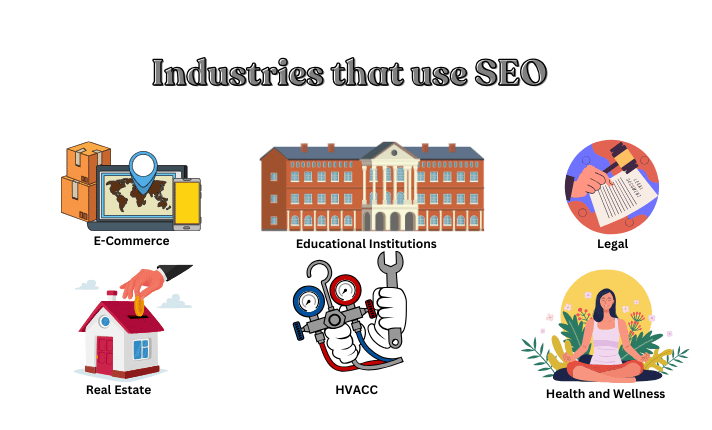Why SEO Matters Across Different Sectors
Are you wondering whether your industry can benefit from SEO? You’re not alone. Many business owners grapple with this question, especially in this era of internet where search engine rankings can make or break a business. So, which industries are suitable for SEO? Let’s break it down with some concrete examples and data-driven insights.
What Makes an Industry SEO-Friendly?
Before diving into the specifics, it’s essential to understand what makes an industry ripe for SEO. Industries that thrive on customer engagement, information dissemination, and local visibility typically see the most significant benefits from SEO. But that’s not to say others can’t win big. If your business relies on online visibility, SEO is for you.
Industries That Crush It With SEO
1. E-Commerce
When we talk about industries that are suitable for SEO, e-commerce is the first that comes to mind. Why? Because search is often the first step in the buyer’s journey. Every product has its own keyword, and people are searching for them constantly. Whether you’re selling shoes, electronics, or custom furniture, ranking for product-related queries is crucial.
SEO tactics for e-commerce:
- Product pages optimized for long-tail keywords.
- Creating informational content that addresses customer pain points (think “How to Choose the Best Running Shoes”).
- Internal links to product comparison and review pages.

2. Local Services (Plumbers, Electricians, HVAC)
Local services depend heavily on SEO. In fact, local SEO could be the deciding factor between a successful business and one that gets lost in the crowd. Google’s local pack can highlight your business above competitors if you rank well for local keywords.
SEO tactics for local services:
- Use Google My Business to its fullest potential.
- Focus on location-specific keywords like “best plumber in [your city].”
- Leverage customer reviews to improve credibility and rankings.
Is local SEO dead? Check out our full analysis.
3. Real Estate
When people are looking to buy, sell, or rent, they turn to search engines for listings, advice, and agent recommendations. Real estate is another industry that thrives on local SEO and detailed content that educates potential buyers or renters.
SEO tactics for real estate:
- Optimize for hyperlocal keywords like “homes for sale in [neighborhood].”
- Create detailed community guides and market trend articles.
- Use video tours and virtual home tours to enrich your content and improve time-on-page metrics.
4. Health and Wellness
The health industry sees constant searches for symptoms, treatments, fitness tips, and more. Healthcare providers, wellness blogs, and fitness trainers can all benefit from well-executed SEO strategies.
SEO tactics for health & wellness:
- Focus on trust signals like author credentials (E-E-A-T factor).
- Write comprehensive guides on common health issues, answering questions that your target audience is actively searching.
- Regularly update your content with the latest medical findings and news.
5. Legal Services
Law firms rely on SEO to attract clients looking for specific legal help, whether it’s family law, criminal defense, or corporate law. People trust search engines to guide them when they’re in need, and the right SEO strategy can help you become the trusted name they turn to.
SEO tactics for legal services:
- Write case study posts that showcase your expertise in specific cases.
- Use local SEO strategies for queries like “best lawyer in [city].”
- Create FAQ sections to answer common legal questions, reducing bounce rates.
6. Educational Institutions
Schools, colleges, and online learning platforms can use SEO to attract students. Ranking high for courses, certifications, and degree programs is critical.
SEO tactics for educational institutions:
- Target career-focused keywords like “best online MBA programs”.
- For Local Educational i
- Use content marketing to offer free resources like whitepapers or eBooks that attract potential students.
- Build authority backlinks from educational sites to increase trust.
7. Finance and Insurance
Financial services are highly competitive online. But with the right SEO strategy, even smaller firms can rank for highly lucrative keywords in areas like investment advice, insurance plans, and loans.
SEO tactics for finance and insurance:
- Focus on long-form content that answers common financial questions.
- Include clear, actionable calls-to-action to generate leads.
- Target YMYL (Your Money, Your Life) keywords and ensure your content demonstrates expertise, authoritativeness, and trustworthiness.
How To Optimize for SEO Success Across All Industries
Regardless of the industry you’re in, some general SEO principles apply to all:
1. Keyword Research
Identify relevant keywords your target audience is searching for. Tools like Google Keyword Planner, SEMrush, and Ahrefs can help you find keywords with low competition and high intent. Here’s A Visual Guide to Keyword Targeting and On-Page SEO for better understanding of how to target keywords based on intent.
2. On-Page Optimization
Make sure every page is optimized for its target keyword. This includes the title tag, meta description, header tags, and URL structure.
3. User Experience
Google rewards sites that provide a great user experience. Keep your site’s load times fast, make it mobile-friendly, and ensure your navigation is intuitive.
4. Content Quality
Quality content is key. Answer user questions in detail, avoid keyword stuffing, and aim to provide more value than your competitors. Use visual aids like images, infographics, and videos to keep users engaged. SEO Mistakes in Digital Content Production can hurt the ranking so its important to never compromise on content quality.
5. Backlinks
Build high-quality backlinks from reputable websites in your industry. Guest posts, collaborations, and partnerships can be great ways to increase your site’s authority.
FAQs
Which industries benefit the most from SEO? Industries that rely on online visibility—like e-commerce, local services, and health—benefit greatly from SEO.
Can SEO work for small businesses? Yes! Even small businesses can rank well with the right combination of local SEO, content marketing, and backlink strategies.
How long does it take for SEO to work? SEO is a long-term investment. Depending on your industry and competition, it can take 3-6 months to see significant results. Here’s a 3 month SEO plan and for long term here is a 6 month SEO plan.
Conclusion
SEO isn’t just for one type of business or industry. Whether you’re in e-commerce, legal services, or health and wellness, the right SEO strategy can dramatically increase your visibility, traffic, and, ultimately, revenue. Ready to take the leap? It’s time to optimize and watch your rankings soar.
